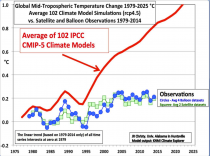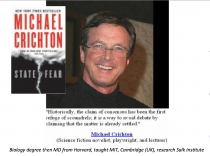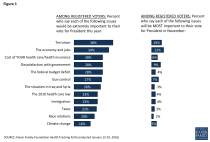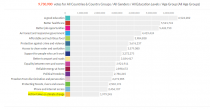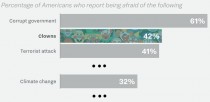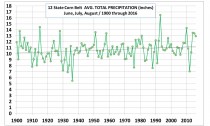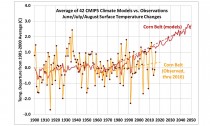By Joseph D’Aleo, CCM, Fellow
Until the last strong El Nino brought the normal spike in global temperatures, there was much ado about what was being called a pause of almost 19 years in global temperature rise. Eventually even the once professional societies like the AMS, had to admit to it and had papers published and many panels at annual meetings discussing why the accelerated warming predicted by climate models and the UN IPCC was not occurring even as global CO2 levels continued to rise.
The first efforts made were to modify the data sets (surface and some balloon and satellite) to bring the data closer into agreement with the models (instead of rethinking the theory and models). Then the got the help from El Nino. A weak La Nina and a declining sun should cause temperatures to fall off and the pause resume but the train may have left the station after the Paris Treaty.
This conflicting data had for several years brought an uncomfortable feeling among many believers, what is called ‘cognitive dissonance’, but most all were able to shake it off especially when they have so many colleagues riding the same grant gravy trains that benefit from the failing theory or have business financial potential and/or personal political ideologies that the plans to address the so-called Catastrophic Anthropogenic Global Warming fits so nicely into.
A fine work over five decades ago by Leon Festinger, a social psychologist helps explain how they can do that and why we may not see a widespread rapid return to sanity on global climate change even as the pause resumes and other evidence mounts the prevailing greenhouse theories are flawed, global warming has ceased and climate change may be largely due to natural variability.
When discomfirmatory (contrary) evidence is presented, Festinger found one condition that often determined whether the belief is discarded or maintained with new fervor by belief with a strongly held belief. That was whether or not the individual believer has social support. It is unlikely that one isolated believer could withstand strong discomfirming evidence. If, however, the believer is a member of a group of convinced persons who can support one another, you might expect the belief to be maintained and the believers to attempt to proselytize or persuade non-members that the belief is correct even in the face of data suggesting otherwise.
Today there is a huge ‘social support’ group of grant toting modelers and researchers, agenda driven or ratings driven journalists, environmentalists and corporations that have realized green is their favorite color and and see this as a way to keep green paper flowing into their coffers and pockets, farmers who are benefiting from the misplaced focus on alternative fuel from crops which has sent the cost for their crops to record levels, traders and major market firms licking their chops at the prospects of big time money from carbon trading, big oil and alternative energy companies that have realized this is the vector to bigger profits and the politicians and political activists who see it as a way to accomplish ulterior goals about changing society and increasing their powerbase.
In reality although there is claimed consensus, scientists and the public are not so convinced. It will only be after the public realizes they have been snookered or like in the UK, they realize the pains for adhering to the green assault on humanity is insufferable (Brexit was largely due to this) that the situation may turn on them. We can only hope damage done here is not great or irreparable when that day finally comes. That is why you must consider your vote seriously next month.
Perhaps, the greens and the administration and untrustworthy mainstream media with the outrageous claims saying ‘global warming is the greatest peril that humanity faces” has them sensing a snake oil salesman situation.
The late great Michael Crichton, author of State of Fear on this topic, said “Historically, the claim of consensus is the first refuge of scoundrels; it is a way to avoid debate by claiming the matter is already settled.” “Whenever you hear the consensus of scientists agrees on something or other, reach for your wallet, because you’re being had.”
“Let’s be clear: the work of science has nothing whatever to do with consensus. Consensus is the business of politics. In science, consensus is irrelevant. What is relevant is reproducible results. The greatest scientists in history are great precisely because they broke with the consensus.” (Galileo, Newton, Einstein, etc)
He concluded: “There is no such thing as consensus science. If it’s consensus, it isn’t science. If it’s science, it isn’t consensus. Period.”
We all miss the man and his work. Read more on ‘cognitive dissonance’ and Festinger’s work “When Prophecies Fail” here.
HELP IF YOU CAN
I know so many of you are trying to contribute to political candidate races now (very important), but if you can help ICECAP cover its expenses, we would greatly appreciate it. We have no advertising and unlike many of the warmist sites don’t have money from big financiers. Many of the pieces published including the research paper covered in several spots on this home page and over the years numerous AMICI briefs (sample) to the courts trying to curb the regulatory assault on our energy and businesses, large and small have all been done pro-bono. I and my colleagues have all written pro-bono pieces in newspapers and on-line and participated in radio interviews and even hour long local cable TV shows to try and bring reality about the science and awareness of the dangers from the proposed remedies (Climate Action Plan and the EPA regulations) to the public. We get abuse for doing so and claims we are tied to big oil when their heroes are the recipients of the $1.5 trillion that has fed this monster.
The donate button is secure or if you prefer write me at frostdoc@aol.com and I can give you an address you can mail a check to. Small amounts are welcome. Thank you for helping over the last 8 years - 76 million page hits to date and counting. God bless you.
-----------
The public is not buying what the world ‘leaders’ proclaim - US and UN polls. In fact they fear clowns more the global warming.
One of the claims made is that CO2 increases are now or will soon cause crop yields to decline. Roy Spencer replies:
Global Warming be Damned: Record Corn, Soybeans, Wheat
Dr. Roy Spencer
For many years we have been warned that climate change is creating a “climate crisis”, with heat and drought reducing agricultural yields to the point that humanity will suffer. Every time there’s a drought, we are told that this is just one more example of human-caused climate change.
But droughts have always occurred. The question is: Are they getting worse? And, has modest warming had any effects on grain yields?
We have yet to experience anything like the Dust Bowl drought of the 1930s, or the mega-droughts the western U.S. tree ring record suggests occurred in centuries past.
And even if they do occur, how do we know they were not caused by the same natural factors that cause those previous droughts? While “global warming” must cause more precipitation overall (because there is more evaporation), whether this means increased drought conditions anywhere is pretty difficult to predict because it would require predicting an average change in weather patterns, which climate models so far have essentially no skill at.
So, here we are with yet another year (2016) experiencing either record or near-record yields in corn, soybeans, and wheat. Even La Nina, which was widely feared would cause reduced crop yields this year, did not materialize.
How can this be?
How has Climate Changed in the U.S. Corn Belt?
Let’s start with precipitation for the main growing months of June-July-August over the 12-state Corn Belt (IL, IN, IA, KS, NE, ND, SD, MO, WI, MN, MI, OH). All data come from official NOAA sources. Since 1900, if anything, there has been a slight long-term increase in growing season precipitation:
In fact, the last three years (2014-16) has seen the highest 3-yr average precip amount in the entire record.
If we examine temperature, there has been some warming in recent decades, but nothing like that predicted for the same region from the CMIP5 climate models:
That plot alone should tell you that something is wrong with the climate models. It’s not even obvious a statistically significant warming has occurred, let alone attribute it to a cause, given all of the adjustments (or lack of proper adjustments) that have been made to the surface thermometer data over the years. Note the models also cannot explain the Dust Bowl warmth of the 1930s, because the models do not mimic the natural changes in Pacific Ocean circulation which are believed to be the cause.
So, has Climate Change Not Influenced Grain Yields?
Let’s assume the temperature and precipitation observations accurately reveal what has really happened. Has climate change since 1960 impacted corn yields in the U.S.?
As part of some consulting I do for a company that monitors grain markets and growing conditions around the world, last year I quantified how year-to-year variations in U.S. corn yields depend on year-to-year changes in precipitation and temperature, over the period 1960 through 2014. I then applied that relationship to the long-term trends in precipitation and temperature.
What I found was that there might be a small long-term decrease in yields due to climate change, but it is far exceeded by technological advancements that increase yields.
In fact, based upon studies of the dependence of corn yield on CO2 fertilization, the negative climate impact is even outweighed by the CO2 fertilization effect alone. (More CO2 is well known to fertilize, as well as increase drought tolerance and make plants more efficient in their water use).
The people I know in the grain trading business do not even factor in climate change...primarily because they do not yet see evidence of it.
It might well be there...but it is so overwhelmed by other positive factors, especially improved varieties, that it cannot be observed in corn yield data. In fact, if varieties can be made more heat tolerant, it might be that there will be no climate change impact on yields.
So, once again, claims of severe agricultural impacts from climate change continue to reside in the realm of science fiction...in the future, if at all.



